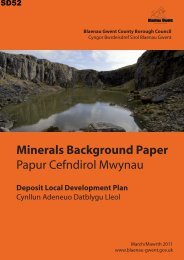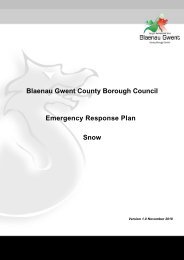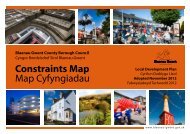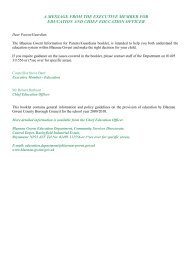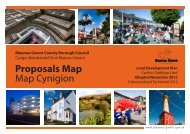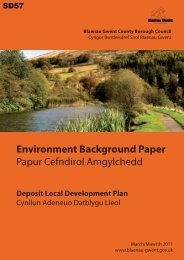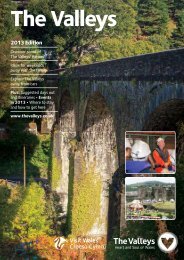Planning Policy Wales - Brecon Beacons National Park
Planning Policy Wales - Brecon Beacons National Park
Planning Policy Wales - Brecon Beacons National Park
You also want an ePaper? Increase the reach of your titles
YUMPU automatically turns print PDFs into web optimized ePapers that Google loves.
6.5 Development control and the historic environment<br />
Archaeological remains<br />
6.5.1 The desirability of preserving an ancient monument and its setting is a material<br />
consideration in determining a planning application, whether that monument is scheduled or<br />
unscheduled. Where nationally important archaeological remains, whether scheduled or not,<br />
and their settings are likely to be affected by proposed development, there should be a presumption<br />
in favour of their physical preservation in situ. In cases involving lesser archaeological remains, local<br />
planning authorities will need to weigh the relative importance of archaeology against other factors,<br />
including the need for the proposed development.<br />
6.5.2 The needs of archaeology and development can be reconciled, and potential conflict<br />
very much reduced, if developers discuss their proposals for development with the local planning<br />
authority at an early stage. Archaeological assessments commissioned by developers (sometimes<br />
as part of a wider Environmental Impact Assessment) can help to provide information on the<br />
archaeological sensitivity of a site before submitting a planning application. If important remains<br />
are thought to exist at a development site, the planning authority should request the prospective<br />
developer to arrange for an archaeological field evaluation to be carried out before any decision<br />
on the planning application is taken 17 . The results of any assessment and/or field evaluation should<br />
be provided as part of a planning application. If this information is not provided, authorities should<br />
consider whether it is appropriate to direct the applicant to supply further information, or whether to<br />
refuse permission for inadequately documented proposals.<br />
6.5.3 Where local planning authorities decide that physical preservation in situ of archaeological<br />
remains is not justified in the circumstances of the case, and that development resulting in the<br />
destruction of the archaeological remains should proceed, before granting planning permission the<br />
authority needs to be satisfied that the developer has made appropriate and satisfactory provision<br />
for the archaeological investigation and subsequent recording of the remains and the publication<br />
of the results. Archaeological investigations should be carried out before development commences,<br />
working to a project brief prepared by the planning authority.<br />
6.5.4 Local planning authorities may impose conditions to protect a monument and require that<br />
an archaeological watching brief is carried out. In order to secure the provision of an appropriate<br />
archaeological investigation and subsequent recording of remains, a negative condition may be<br />
imposed prohibiting the carrying out of the development until such time as works or other action<br />
(for example, an excavation), have been carried out by a third party 18 .<br />
6.5.5 Archaeological remains may only become apparent when development has commenced.<br />
Where such remains are deemed by the Assembly Government to be of national importance,<br />
the remains may be scheduled. In these circumstances, developers would need to seek separate<br />
Scheduled Monument Consent before continuing work. The local planning authority or the Assembly<br />
Government may revoke planning consent if deemed necessary.<br />
90<br />
<strong>Planning</strong> <strong>Policy</strong> <strong>Wales</strong> Edition 3 - July 2010 - Chapter 6 Conserving the Historic Environment


